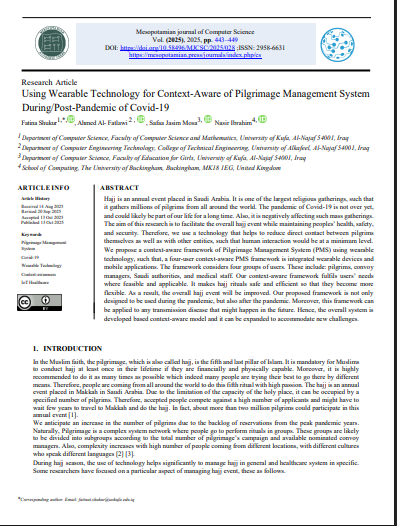Using Wearable Technology for Context-Aware of Pilgrimage Management System During/Post-Pandemic of Covid-19
Main Article Content
Abstract
Hajj is an annual event placed in Saudi Arabia. It is one of the largest religious gatherings, such that it gathers millions of pilgrims from all around the world. The pandemic of Covid-19 is not over yet, and could likely be part of our life for a long time. Also, it is negatively affecting such mass gatherings. The aim of this research is to facilitate the overall hajj event while maintaining peoples’ health, safety, and security. Therefore, we use a technology that helps to reduce direct contact between pilgrims themselves as well as with other entities, such that human interaction would be at a minimum level. We propose a context-aware framework of Pilgrimage Management System (PMS) using wearable technology, such that, a four-user context-aware PMS framework is integrated wearable devices and mobile applications. The framework considers four groups of users. These include: pilgrims, convoy managers, Saudi authorities, and medical staff. Our context-aware framework fulfils users’ needs where feasible and applicable. It makes hajj rituals safe and efficient so that they become more flexible. As a result, the overall hajj event will be improved. Our proposed framework is not only designed to be used during the pandemic, but also after the pandemic. Moreover, this framework can be applied to any transmission disease that might happen in the future. Hence, the overall system is developed based context-aware model and it can be expanded to accommodate new challenges.
Article Details
Issue
Section

This work is licensed under a Creative Commons Attribution 4.0 International License.
How to Cite
References
[1] S. Basahel, A. Alsabban, and M. Yamin, “Hajj and umrah management during covid-19,” International Journal of Information Technology, vol. 13, no. 6, pp. 2491–2495, 2021.
[2] A. J. Showail, “Solving hajj and umrah challenges using information and communication technology: A survey,” IEEE Access, vol. 10, pp. 75404– 75427, 2022.
[3] A. A. A. Abalkhail and S. M. A. Al Amri, “Saudi arabia’s management of the hajj season through artificial intelligence and sustainability,” Sustainability, vol. 14, no. 21, p. 14142, 2022.
[4] J. Almalki, “Internet of things application in controlling the coronavirus disease spread in hajj season,” International Transaction Journal of Engineering, Management, & Applied Sciences & Technologies, vol. 13, no. 1, pp. 1–14, 2022.
[5] M. Binsawad and M. Albahar, “A technology survey on iot applications serving umrah and hajj,” Applied Computational Intelligence and Soft Computing, vol. 2022, 2022.
[6] H. A. M. Malik, F. Abid, A. R. Gilal, and A. S. Raja, “Use of cloud computing in hajj crowed management and complex systems,” in 2017 4th IEEE International Conference on Engineering Technologies and Applied Sciences (ICETAS), pp. 1–5, IEEE, 2017.
[7] E. A. Felemban, F. U. Rehman, S. A. A. Biabani, A. Ahmad, A. Naseer, A. R. M. A. Majid, O. K. Hussain, A. M. Qamar, R. Falemban, and F. Zanjir, “Digital revolution for hajj crowd management: a technology survey,” IEEE Access, vol. 8, pp. 208583–208609, 2020.
[8] M. K. Shambour and A. Gutub, “Progress of iot research technologies and applications serving hajj and umrah,” Arabian Journal for Science and Engineering, vol. 47, no. 2, pp. 1253–1273, 2022.
[9] B. Singh, B. Datta, A. Ashish, and G. Dutta, “A comprehensive review on current covid-19 detection methods: From lab care to point of care diagnosis,” Sensors International, vol. 2, p. 100119, 2021.
[10] J. P. Sène, F. Kayusi, F. S. Mohammed, B. Willbroad, C. A. Ariwaodo, and B. Mugisha, “Correlation Analysis of COVID-19 Case Trends in Dakar, Senegal”, EDRAAK, vol. 2024, pp. 106–112, Aug. 2024.
[11] S. S. Qasim, Tran., “IoT of Healthcare Innovation Solutions for Predictable Virus Detection”, Babylonian Journal of Internet of Things, vol. 2024, pp. 126–136, Nov. 2024.
[12] S. Binkheder, R. N. Aldekhyyel, A. AlMogbel, N. Al-Twairesh, N. Alhumaid, S. N. Aldekhyyel, and A. A. Jamal, “Public perceptions around mhealth applications during covid-19 pandemic: A network and sentiment analysis of tweets in saudi arabia,” International Journal of Environmental Research and Public Health, vol. 18, no. 24, p. 13388, 2021.
[13] Saudi-Press-Agency, “Sdaia launches tawakkalna app to facilitate the issuance of movement permits electronically during the cur- few period,” 2020.
[14] T. Alanzi, “A review of mobile applications available in the app and google play stores used during the covid-19 outbreak,” Journal of multidisciplinary healthcare, vol. 14, pp. 45–57, 2021.
